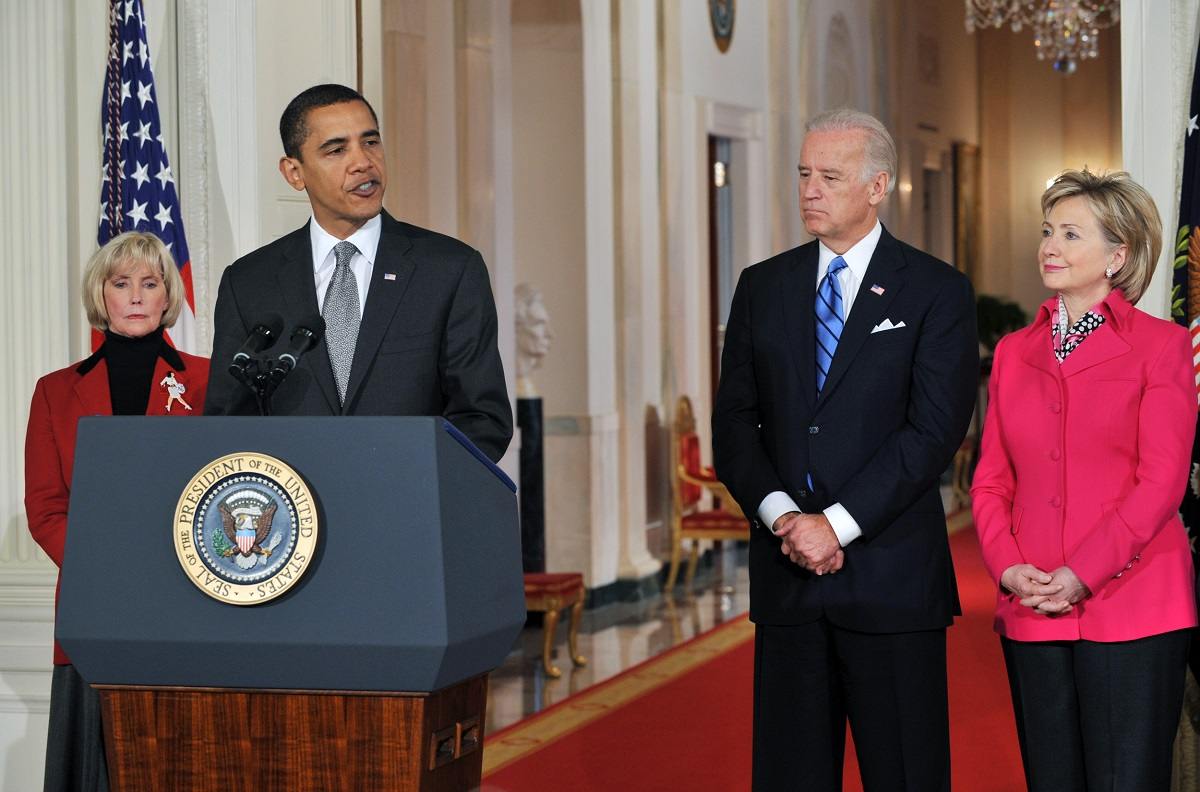
Ms. Ledbetter revisited the Supreme Court in 2018, 11 years after it ruled against her in a landmark wage-discrimination case.
13:31 JST, October 15, 2024
Lilly Ledbetter, a manager at a Goodyear tire plant who, after discovering that she was earning far less than the men in her position, spent years battling for equal pay for women, filing a lawsuit that reached the Supreme Court and inspired federal legislation named in her honor, died Oct. 12 at a hospital in Birmingham, Ala. She was 86.
The cause was respiratory failure, according to a statement from the family. Her death came two days after the premiere of “Lilly,” a biopic starring Patricia Clarkson, at the Hamptons International Film Festival in New York.
Ms. Ledbetter never set out to become a face of the equal-pay movement. But while nearing retirement in 1998 at her Goodyear plant in Gadsden, Ala., she received an anonymous letter – “a torn piece of copy paper with black handwriting on it” – that revealed she was making much less than men in the same position: $3,727 a month, compared with colleagues earning between $4,286 and $5,236 during the same period.
“When I saw that, it took my breath away,” she told NPR in a 2009 interview. “I felt humiliated. I felt degraded. I had to sort of get my composure back to go ahead to perform my job and then, the first day off, I went to Birmingham, Alabama, and filed a charge with the EEOC,” the Equal Employment Opportunity Commission.
Ms. Ledbetter had been a manager at the plant for 19 years. She was among the only women in her position, and recalled that from the beginning of her time at the plant she faced sexism and discrimination. “I take bossin’ from a woman at home; I’m not doin’ it here,” male employees would tell her. Once, after she disciplined several workers in a short period, her tires were slashed and her car was keyed.
In the early 1980s, Ms. Ledbetter filed an EEOC complaint after her department manager asked for sexual favors in exchange for good performance reviews. The manager was reassigned, according to Ms. Ledbetter, but she found herself isolated from colleagues who branded her a troublemaker. She was further ostracized after filing the pay-equity complaint, assigned to an arduous job inspecting Hummer tires that weighed 80 pounds and had to be moved by hand.
Ms. Ledbetter believed the position was a form of retaliation. Told by a doctor that she would “be crippled in two years” if she kept up the work, she retired earlier than planned and, in 1999, pursued her fair-pay case with help from a lawyer, arguing that her lower pay at Goodyear was a violation of Title VII of the Civil Rights Act of 1964.
Her employer claimed that Ms. Ledbetter’s salary was lower because of a merit-pay plan in which she ranked poorly. But a jury sided with Ms. Ledbetter, concluding it was “more likely than not” that she had been paid “an unequal salary because of her sex.” She was awarded about $3.5 million, which a judge reduced to $360,000.
Ms. Ledbetter ended up receiving nothing in the case. After Goodyear appealed, the suit made its way to the Supreme Court, which ruled 5-4 in 2007 that her complaint should have been thrown out. According to the court, Ms. Ledbetter needed to have filed her claim within 180 days of “the alleged unlawful employment practice” – the initial paycheck in which she was compensated less than the men around her.
As Ms. Ledbetter pointed out, it had taken years, not months, to obtain evidence of discrimination, in part because Goodyear barred employees from discussing their salaries. Even if she had known early on, it would have been difficult, as a brand-new employee, to challenge the company in a formal government complaint.
“The effect of this decision was to virtually wipe out, as a practical matter, the ability to protect against pay discrimination in the courts,” said Marcia Greenberger, who worked closely with Ms. Ledbetter while serving as co-president of the National Women’s Law Center. In a phone interview, she said that the ruling in Ledbetter v. Goodyear upended years of precedent surrounding Title VII, with employees previously able to file a complaint within six months of a discriminatory paycheck.
“What this decision put in place all of a sudden was a premium on employers to hide discrimination,” she said. “If you didn’t know about it, and six months went by as a new employee, they could discriminate against you in pay for the rest of the time you were there, with impunity.”
Ms. Ledbetter and her allies took some solace in Justice Ruth Bader Ginsburg’s dissent, which the justice read aloud from the bench in a signal of her displeasure. “The court does not comprehend, or is indifferent to, the insidious way in which women can be victims of pay discrimination,” Ginsburg said, before calling on Congress “to note and to correct this court’s parsimonious reading of Title VII.”
For the next two years, Ms. Ledbetter urged Congress to take action, shuttling between her home in Alabama, where her husband was being treated for cancer, and Washington, where she testified before congressional committees on behalf of legislation that became the Lilly Ledbetter Fair Pay Act of 2009.

Ms. Ledbetter, left, with President Barack Obama, Vice President Joe Biden and Secretary of State Hillary Clinton at a White House ceremony for the Lilly Ledbetter Fair Pay Act of 2009.
Signed by newly inaugurated President Barack Obama, who had backed the legislation on the campaign trail, the law effectively restored the earlier interpretation of Title VII, which would have allowed Ms. Ledbetter to press her claim in court. Because the law was not retroactive, it did not apply to Ms. Ledbetter, who joined Obama in the White House when he signed the bill, the first of his presidency.
“Goodyear will never have to pay me what it cheated me out of,” Ms. Ledbetter said afterward in the State Dining Room. “In fact, I will never see a cent. But with the president’s signature today I have an even richer reward.”
An only child, she was born Lilly Lynn McDaniel in Possum Trot, Ala., on April 14, 1938. She grew up in nearby Jacksonville, Ala., picking cotton on a family farm to help make ends meet. Her mother managed the home, and her father was a mechanic at the Anniston Army Depot.
Ms. Ledbetter married Charles Ledbetter, who became a command sergeant major in the Army, in 1955. They had two children, whom Ms. Ledbetter raised while helping support the family with jobs as a manager at H&R Block and as an assistant financial aid officer at Jacksonville State University. She joined Goodyear as a supervisor in 1979.
In a 2012 memoir, “Grace and Grit,” Ms. Ledbetter wrote that her husband was initially skeptical of her working outside the home, afraid that it would take her away from their family and church. But she found that having a job provided stability in her life. Her husband eventually came around to it.
“I no longer felt out of sorts,” she wrote, “like some pollywog adrift in the water; instead, I had a goal to fulfill.”
Ms. Ledbetter’s husband died in 2008. Survivors include her children, Vickie Ledbetter Saxon and Phillip Ledbetter; four grandchildren; and three great-grandchildren.
In recent years, Ms. Ledbetter continued to campaign for pay equity, advocating legislation including the Paycheck Fairness Act, which would allow employees to inquire about the pay rates of their peers and expand their ability to obtain damages for paycheck discrimination. According to the National Committee on Pay Equity, women working full-time earn only 84 cents for every dollar earned by men.
“I stood up for my money,” Ms. Ledbetter told AL.com in 2018, reflecting on her lawsuit. “I never got what I was entitled to. And I was just the tip of the iceberg.”
Top Articles in News Services
-

Survey Shows False Election Info Perceived as True
-

Hong Kong Ex-Publisher Jimmy Lai’s Sentence Raises International Outcry as China Defends It
-

Japan’s Nikkei Stock Average Touches 58,000 as Yen, Jgbs Rally on Election Fallout (UPDATE 1)
-

Japan’s Nikkei Stock Average Falls as US-Iran Tensions Unsettle Investors (UPDATE 1)
-

Trump Names Former Federal Reserve Governor Warsh as the Next Fed Chair, Replacing Powell
JN ACCESS RANKING
-

Producer Behind Pop Group XG Arrested for Cocaine Possession
-

Japan PM Takaichi’s Cabinet Resigns en Masse
-

Man Infected with Measles Reportedly Dined at Restaurant in Tokyo Station
-

Israeli Ambassador to Japan Speaks about Japan’s Role in the Reconstruction of Gaza
-

Videos Plagiarized, Reposted with False Subtitles Claiming ‘Ryukyu Belongs to China’; Anti-China False Information Also Posted in Japan


























